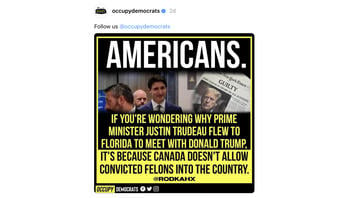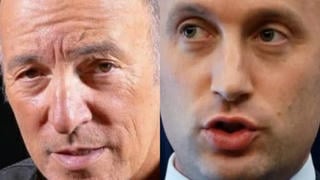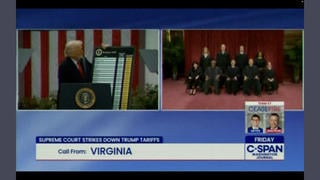
Did Canada ban President-elect Donald Trump from entering the country as of November 2024 because of his felony conviction? No, that's not true: A person is only declared inadmissible when they try to cross into the country, and no credible source reported that Trump tried to enter Canada before Canadian Prime Minister Justin Trudeau visited him in Florida. Contrary to the implication in a social media post, no publicly available information confirms that the location of the visit proved a ban against Trump entering Canada.
The implied claim appeared in a post (archived here) on Threads on December 1, 2024. It said:
AMERICANS.IF YOU'RE WONDERING WHY PRIMEMINISTER JUSTIN TRUDEAU FLEW TOFLORIDA TO MEET WITH DONALD TRUMP,IT'S BECAUSE CANADA DOESN'T ALLOWCONVICTED FELONS INTO THE COUNTRY.
(Source: X screenshot taken on Wed Dec 4 16:34:59 2024 UTC)
The post implied that Canadian authorities determined that Trump's felony conviction barred him from entering the country as of November 2024. No publicly known facts prove that.
Trudeau's visit
Trudeau flew to Trump's residence in Florida on November 29, 2024. The visit followed Trump's November 25, 2024, post on Truth Social (archived here) about imposing 25 percent tariffs on Canadian imports to the United States.
Trudeau's appearance at Mar-a-Lago was widely reported as "unannounced." That description was used by both Politico (archived here) and Fox News (archived here). Canadian broadcaster CBC News (archived here) referred to the event as a "surprise dinner," and Reuters (archived here) pointed out that Trudeau's "public itinerary did not list a scheduled visit to Florida" before he "was seen leaving a hotel in West Palm Beach, Florida, to go to Trump's Mar-a-Lago resort."
Canada's law
A felony conviction is one reason (archived here) why American citizens may not be allowed to enter Canada. However, in the case of Americans who don't need a visa or electronic travel authorization to travel to Canada, that decision about criminal inadmissibility is made by an officer at the border -- not ahead of time before a person even tries to enter Canada.
A spokesperson for the Canada Border Services Agency (CBSA) told Lead Stories via email on December 3, 2024:
Admissibility of all travellers is decided on a case-by-case basis and based on the information made available at the time of entry. Upon arrival at a Canadian port of entry, travellers must demonstrate to a CBSA officer that they meet the requirements for entry into Canada.
A search across reports on Google News for key phrases seen here (archived here) didn't produce a single article about any attempt by Trump to travel to Canada between the 2024 U.S. presidential election and this writing.
As of December 4, 2024, Trump's plane flight history was unavailable on commercial flight tracking websites, meaning that they could not have become a source of publicly available information about his whereabouts, either.
While an American citizen can't be barred from entering Canada in advance, Canadian law offers a mitigation mechanism (archived here) for individuals with a criminal history: People can apply before a trip, and in some cases, it may help to overcome the difficulties at the border.
Canadian officials will not publicly disclose, confirm or deny any of that. In the December 3, 2024, email, the CBSA spokesperson told Lead Stories that in Canada, "an individual's border and immigration information is considered private and protected by the Privacy Act." That excludes one more avenue that could have hypothetically produced the evidence confirming the claim reviewed in this article.
Heads of state
Under international law (archived here), heads of state are given "special treatment" when they act as "a representative of that State and not in his or her personal interest."
Francois Crépeau (archived here), a professor of public international law at McGill University, told Lead Stories via email on December 3, 2024, that it means "complete personal immunity from jurisdiction in any criminal prosecution before the courts of a foreign State for any crime they may have committed, regardless of its gravity, with potentially (this is slowly evolving) the exception of prosecutions for genocide, crimes against humanity, war crimes and aggression." However, it's not entirely clear what degree of protection international law grants to a president-elect who hasn't assumed office yet.
Evelyn Cruz (archived here), a clinical law professor at Arizona State University, told Lead Stories via email on December 4, 2024:
As a private citizen he could be barred from entering Canada if Canadian statutes have such a bar ... But he's in a quasi-status of 'President Elect' and my guess is that countries would waive his convictions under some kind of national interest /sovereignty construct or loophole available in their admission regulatory structure to avoid an international diplomatic incident. Of course, once he takes office he will likely be allowed to travel under a diplomatic passport and pretty much every country allows someone with that type of passport to avoid being subject to immigration bars.
In 2000, it was reported (archived here) that George W. Bush (archived here) could have had similar difficulties entering Canada because of a DUI arrest years earlier, but he was able to travel to the country on multiple occasions during his presidency (archived here).
As of November 29, 2024, when Trudeau flew to see him in Florida, Trump's criminal case was not fully over: He was still awaiting the sentencing. Later, on December 3, 2024, Trump's legal team asked a judge to throw out the conviction (archived here), and, as of this writing, the outcome of the motion was not known.
Trump is scheduled to formally assume office on January 20, 2025 (archived here).
Other Lead Stories fact checks of claims concerning Donald Trump can be found here. Articles about the 2024 U.S. presidential election are here.

















